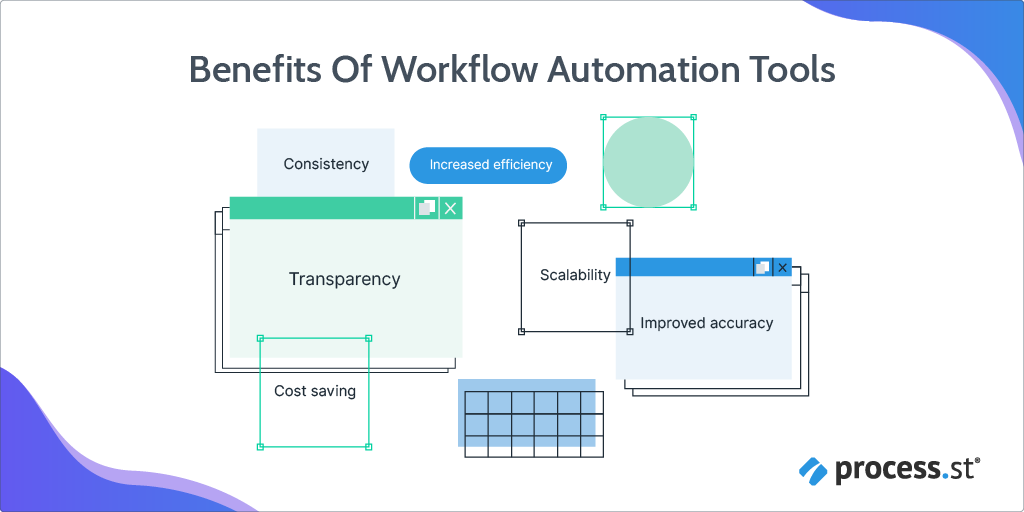What is The Best Workflow Automation Tool, And Do You Need it?
Looking for a solution to streamline your business processes and increase productivity? Look no further than the powerful workflow automation tool!
Are you tired of spending hours on tedious and repetitive tasks that leave you feeling drained and unproductive?
Well, have no fear because the solution to your workflow woes is here!
With the power of workflow automation, you can eliminate errors, streamline processes, and focus on what really matters – growing your business!
So let us take you on a journey through the world of workflow automation, from the best workflow automation tools to real-world examples of automation in action.
Get ready to experience the future of business – it’s time to unleash the power of the workflow automation tool!
Examples of workflow automation tools
Now that we’ve covered the benefits of workflow automation let’s take a look at some examples of workflow automation tools that you can use to optimize processes.
From open-source tools to enterprise-level solutions, there are a variety of options available to fit the needs and budgets of businesses of all sizes.
In this section, we’ll explore some popular workflow automation tools and their key features.
Process Street
A cloud-based workflow automation tool that helps you create and manage workflows with ease.
Its features include the ability to create process templates, track progress, assign tasks, and integrate with third-party apps.
Pros:
- Easy-to-use, intuitive interface
- Integration with a 100’s of third-party apps
- AI workflow builder for accurate workflow creation
- Massive template gallery
- Pages – perfect for creating personalized documents, such as employee booklets
- Forms let you collect employee and customer feedback quickly
- Able to handle heavy workload
Cons:
- No free plan (but limited time free trial available)
Zapier
A popular workflow automation tool that allows businesses to automate tasks between different apps and services.
Pros:
- Easy-to-use interface
- Wide range of integrations
- Accurate and customizable workflows
Cons:
- Limited customer support
Nintex
A workflow automation tool with features including the ability to create complex workflows and integrate with third-party apps.
Pros:
- Robust workflow creation capabilities
- Integration with many third-party apps
- Strong reporting and analytics capabilities
Cons:
- Can be difficult for beginners
Best open source workflow automation software
When it comes to workflow automation, open source tools can be a great option for businesses that want to save on costs and have more control over their workflows.
In this section, we will explore two open source workflow automation tools that can provide powerful process automation capabilities for businesses without the cost of proprietary software.
These tools offer a wide range of benefits and features but also come with their own set of pros and cons.
Let’s take a closer look at Camunda BPM and Bonita, and what they have to offer for workflow automation.
Camunda BPM
An open source workflow automation tool that offers powerful process automation and management capabilities for free!
Pros:
- Completely free
- Robust automation capabilities
- Integration with some third-party apps
Cons:
- Difficult for beginners
- Limited support for non-technical users
- Limited reporting capabilities
Bonita
Another open source workflow automation tool for those who cannot afford costly software.
Pros:
- Free
- Easy-to-use interface
- Integration with some third-party apps
Cons:
- Limited customization options
- No reporting
- Not much support for users
Both Camunda BPM and Bonita are great options for those who want to take advantage of workflow automation without breaking the bank.
It’s worth remembering that even though free, these tools cannot handle a heavy workload and do not offer as many features as their paid counterparts.
What is workflow automation tool?
Simply put, a workflow automation software is a powerful solution that can revolutionize the way you do business. It’s a type of software that automates repetitive and time-consuming tasks, making business processes more efficient and streamlined.
Workflow automation software can be used in various industries and departments, from sales and marketing to finance and HR.
With a workflow automation tool, you can easily create custom workflows that fit your specific needs and automate processes.
So whether you’re looking to streamline your sales pipeline or improve your customer service, a workflow automation tool can help you achieve your goals.
There are many companies that offer workflow automation software, each with their own unique features and benefits.
That being said, there are also many open-source workflow automation tools that are available free of charge.
When choosing a workflow automation tool, it’s important to consider your specific needs and requirements.
Some tools may be better suited for certain industries or workflows, while others may offer more advanced features and integrations.
What is workflow automation?
Workflow automation refers to the use of technology to automate and streamline repetitive tasks and business processes.
In manual workflows, humans perform a series of tasks, which often leads to delays, errors, and inefficiencies.
With workflow automation, these manual tasks are performed automatically, eliminating the need for human intervention and reducing the risk of human error.
By employing rule-based logic, workflow automation software can execute complex workflows in real-time, ensuring efficient and accurate completion of business processes.
This powerful tool allows users to customize workflows according to their specific requirements, improving productivity, and driving business outcomes.
With features like task management, conditional logic, resource management, and customizable dashboards, workflow automation is an essential tool for businesses of all sizes looking to streamline their processes, increase efficiency, and achieve digital transformation.
Types of workflow automation tools
Several types of workflow automation tools available in the market can help businesses streamline their processes and reduce manual effort.
These tools can automate repetitive tasks, create custom workflows, and improve overall business efficiency.
Workflow automation software eliminates the need for manual tasks, reducing the risk of human error and allowing employees to focus on more complex and strategic work.
Robotic process automation (RPA) is another type of workflow automation tool that utilizes software robots to automate manual processes.
These tools can handle rule-based logic and perform tasks in real-time, without requiring human intervention.
With drag-and-drop interfaces, low-code tools make it easy for business users to build and customize automated workflows according to their specific requirements.
Advanced workflow management software also offers features such as time tracking, resource management, and customizable dashboards to enhance productivity and facilitate digital transformation.
These workflow automation tools are essential for businesses of all sizes, from small to medium enterprises, and can bring a wide range of benefits by streamlining business processes and driving better business outcomes.
Benefits of a workflow automation tool

Workflow automation is a game-changer for those looking to optimize their operations. By leveraging the power of automation tools, you can streamline workflows, reduce errors, and increase productivity.
Let’s dive deeper into the benefits of workflow automation.
Increased efficiency
One of the most significant benefits of workflow automation is the increased efficiency it provides.
Automated workflows can significantly reduce the time and effort required to complete tasks, allowing employees to focus on higher-value activities that drive the business forward.
For example, a sales team can use workflow automation to automatically assign leads to the right salesperson, reducing the time spent on manual assignments.
Improved accuracy
Manual tasks are prone to errors, which can lead to costly mistakes.
With workflow automation, businesses can ensure that every step of the process is carried out correctly and consistently.
For example, an HR team can use workflow automation to automate the onboarding process, ensuring that every new hire is onboarded in a consistent and error-free manner.
Cost saving
Workflow automation can lead to significant cost savings for businesses.
By reducing the need for manual labor and streamlining processes, businesses can redirect resources toward higher-value activities that drive revenue and growth.
For example, an accounting team can use workflow automation to automate the invoice processing and payment process, reducing the need for manual data entry and processing.
Transparency
Workflow automation provides businesses with real-time visibility into their processes.
By tracking the progress of each task, businesses can identify bottlenecks and areas for improvement, allowing them to make data-driven decisions to optimize their workflows.
For example, a marketing team can use workflow automation to track the progress of a marketing campaign, ensuring that all tasks are completed on time and within budget.
Scalability
As businesses grow, so too do their workflows. Manual processes can become increasingly complex and difficult to manage.
However, workflow automation can easily scale to keep up with demand.
For example, an e-commerce business can use workflow automation to automatically process and fulfill orders, ensuring that all orders are processed efficiently and accurately.
Consistency
Automated workflows ensure that every task is carried out the same way every time, leading to greater consistency and standardization.
This can help improve quality and customer satisfaction.
What to look for in a workflow automation tool?

When it comes to choosing a workflow automation tool, there are several factors to consider.
Here are some key things you should look for:
Ease of use
A good workflow automation tool should be easy to use and require minimal training.
Look for tools that offer a user-friendly interface and intuitive drag-and-drop functionality.
Integrations
Make sure the tool you choose integrates seamlessly with your existing software and systems.
Choose tools that offer a wide range of integrations with popular software such as Salesforce, HubSpot, and Microsoft Office.
Customizations
Your workflow automation tool should be customizable to fit your specific needs and requirements.
Search for platforms that allow you to create custom workflows and automate tasks based on your unique business processes.
Analytics and reporting
It’s important to be able to track the performance of your workflows and identify areas for improvement.
The best tools offer advanced analytics and reporting capabilities, such as real-time dashboards and customizable reports.
Security and compliance
Workflow automation tools often handle sensitive data, so it’s important to choose a tool that prioritizes security and compliance.
Look for those that offer robust security features, such as data encryption, access controls, and compliance certifications.
So do you need a workflow automation tool?
The answer is, most definitely, yes!
By leveraging workflow automation tools, you will streamline processes, increase efficiency, reduce errors, and ultimately achieve goals faster.
Whether you’re a small business looking to streamline your operations or a large enterprise seeking to optimize your processes, workflow automation is a powerful tool that can help you achieve your goals.
By embracing automation and continuously refining your workflows, you can position your business for success in today’s ever-changing marketplace.
So what are you waiting for? It’s time to unlock the power of workflow automation and take your business to the next level!







 Workflows
Workflows Projects
Projects Data Sets
Data Sets Forms
Forms Pages
Pages Automations
Automations Analytics
Analytics Apps
Apps Integrations
Integrations
 Property management
Property management
 Human resources
Human resources
 Customer management
Customer management
 Information technology
Information technology


